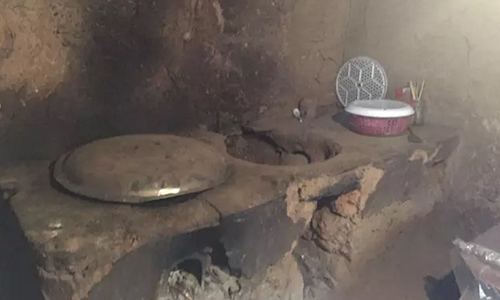
Yang Gailan's home (Photo/People.cn)
Netizens abuzz over poverty, wealth gap after tragedy
Poverty and wealth gap in China have been thrust back into the spotlight after a mother of four axed and poisoned her children to death after her family was allegedly denied their low-income allowance.
China's Internet has been abuzz over the tragedy in the country's impoverished Gansu Province. A large number of netizens attribute the deaths to their abject poverty and lament the income gap between the country's coast regions and western inland. Some, however, have warned the case should not be politicized to attack the government before more details are revealed by investigations.
Yang Gailan, a 28-year-old mother from Northwest China's Gansu Province, killed her four children on August 26 with an axe, and killed herself by drinking pesticide. Li Keying, Yang's husband, also took poison on September 6 after burying his children.
Yang and her family lived in the village of Agushan in Kangle county, and were one of the poorest families there. According to media reports, half of the villagers lived below the poverty line.
Yang's motive remains unclear. The family had been denied the government low-income allowance as the village committee said their annual per person income surpassed the benchmark 2,300 yuan ($343) poverty line.
Some netizens said it was the feeling of desperation and helplessness that killed Yang and her family. Many said they suspect corruption in the allowance distribution.
The Shanghai TV said Yang's father Yang Manshan and her grandmother Yan Lanfang told its reporter they didn't bribe the village cadres, so the village canceled their "low-income family" status.
The report could not be immediately confirmed.
The China Youth Daily reported that the State Council Leading Group Office for Poverty Alleviation and Development sent investigators to Agushan on Friday. They will look into the village's poverty relief policy and will hold a dialogue with villagers.
According to a report from China's two sessions this year, poverty relief is a key part of the Chinese government work for 2016.
On Monday, a story which refers to Yang and those who struggle with poverty in China as "ants in a prosperous age" went viral on the Internet. The story attributed the tragedy to people's indifference to low-income groups and the country's failure in a number of social policies. It also suggested improving social mobility and transferring more resources to poverty alleviation.
Reality check
Dang Guoying, an expert on rural development at the Chinese Academy of Social Sciences, said "this case shocked urban Chinese people living in developed eastern cities, because most of us cannot imagine that millions of Chinese people still live in poverty in rural areas, especially in a country with the world's second largest economy."
"This case serves as a warning to the public and government that while some enjoy a good life in cities, China is still a developing country with an unbalanced development," said Hu Xingdou, a professor at the Beijing Institute of Technology and expert on China's social problems.
"Some local officials have put little effort into poverty relief, because the returns are not high and not obvious to them, so they are not very motivated," Yu Shaoxiang, an expert on social security and poverty relief legislation at the Chinese Academy of Social Sciences, told the Global Times.
There are over 70 million people living below the poverty line, mostly in rural areas, according to data compiled by the National Bureau of Statistics.
The country also had a Gini coefficient, a measurement of inequality, of 0.469 in 2014, which is above the 0.4 World Bank benchmark for a severe wealth gap.
Dang said it is too early to draw a conclusion on Yang's family.
"But this tragedy shows poverty relief in rural areas is very difficult, because there are too many variables involved, such as local officials and villagers' interests," he said. "If we bring poor people to urban areas, the task would be much easier, so we need urbanization."
Dang said he believes urbanization is the key to poverty alleviation, because governments in urban areas have more resources and services, including better transportation, more public servants and more transparency.


















































